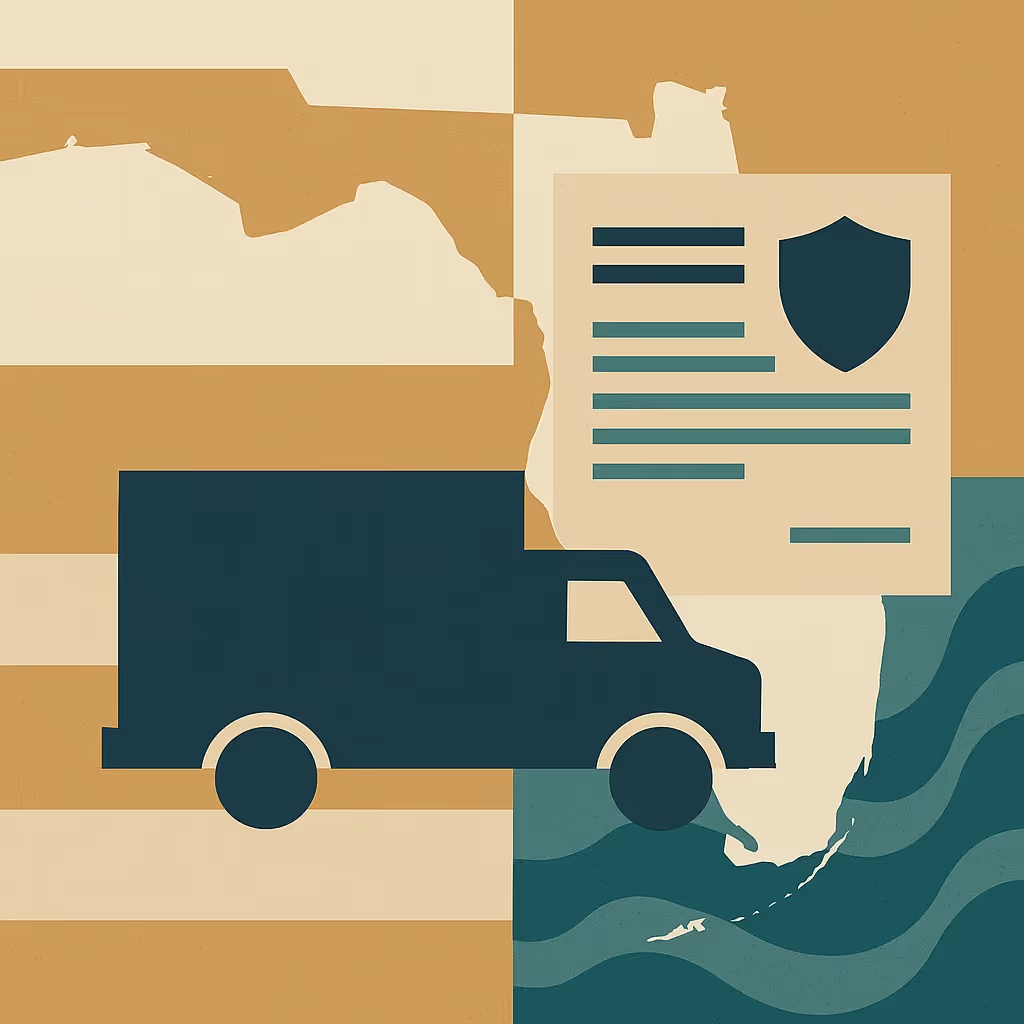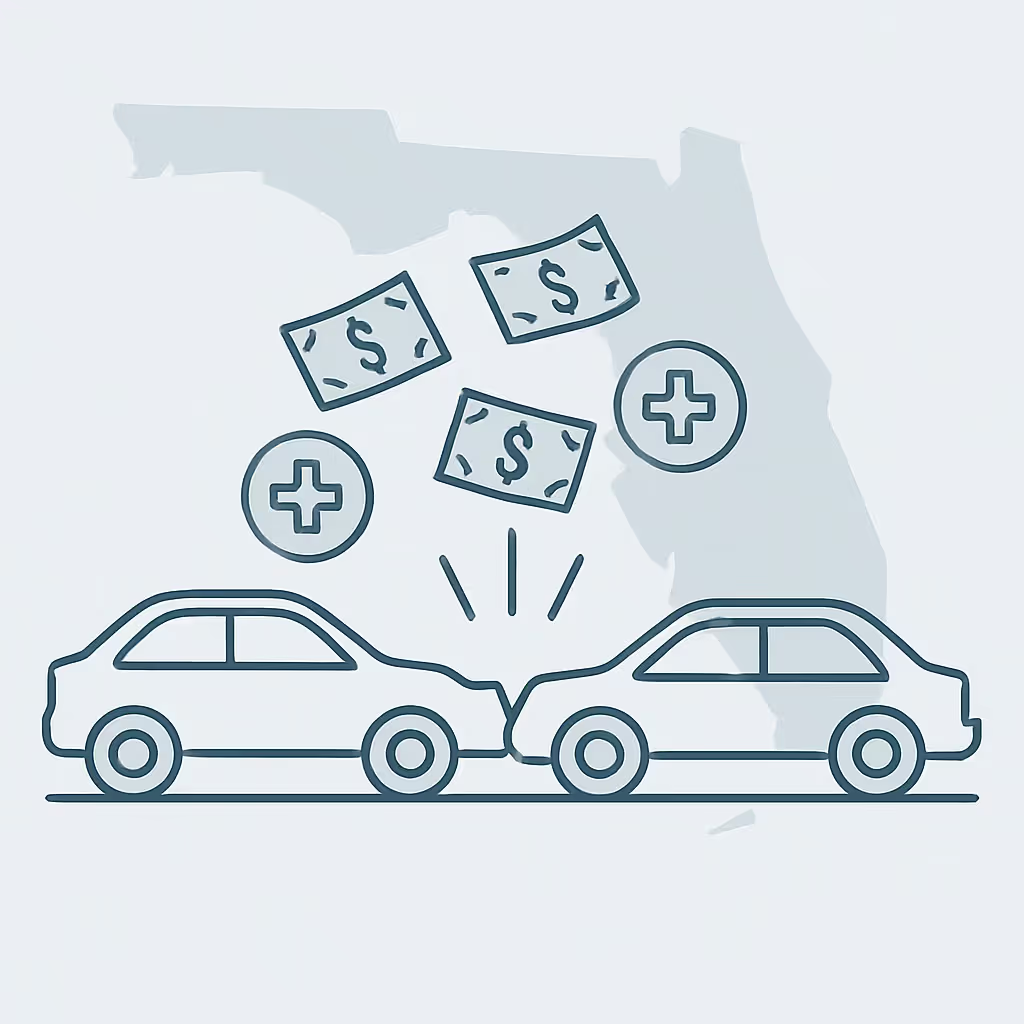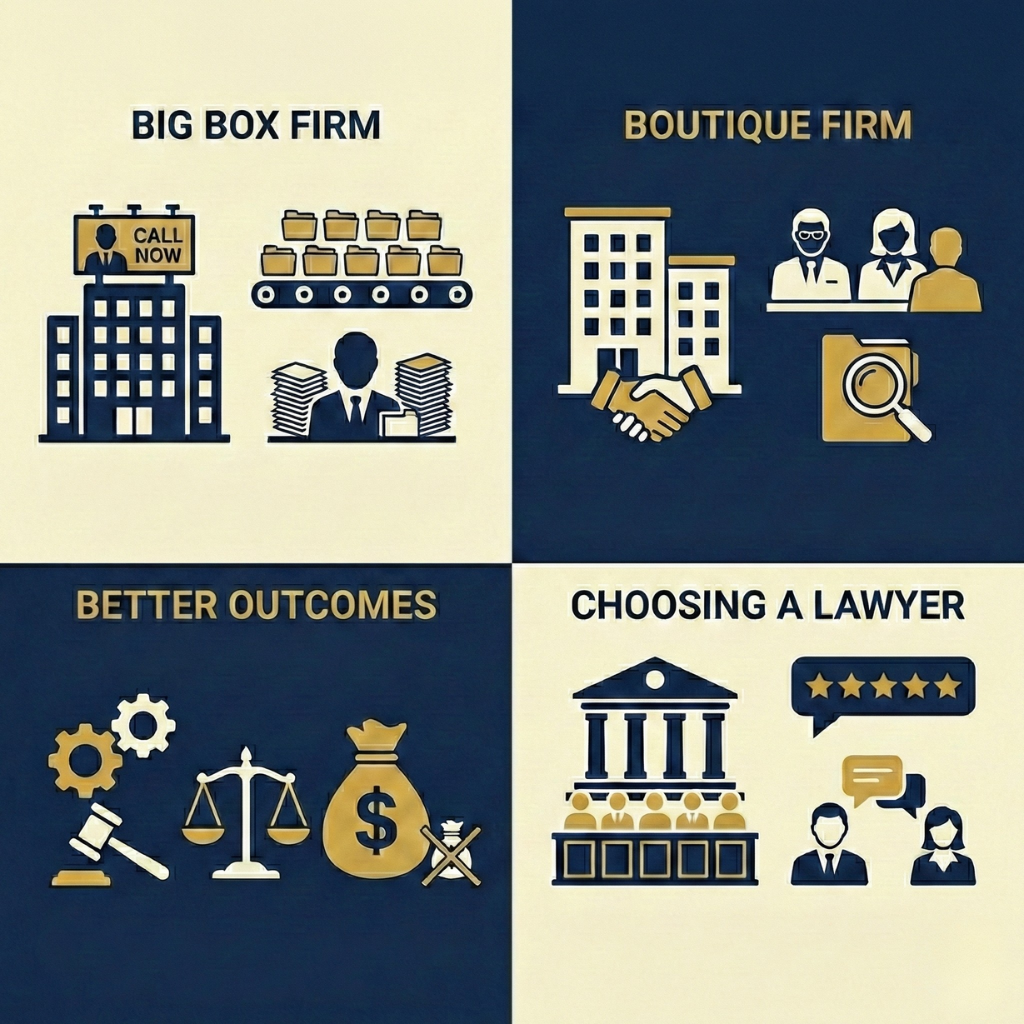What Happens When Someone Not On Your Insurance Crashes Your Car in Florida
Florida car owners face liability when others crash their vehicle. Learn about dangerous instrumentality doctrine, insurance coverage and legal protection.
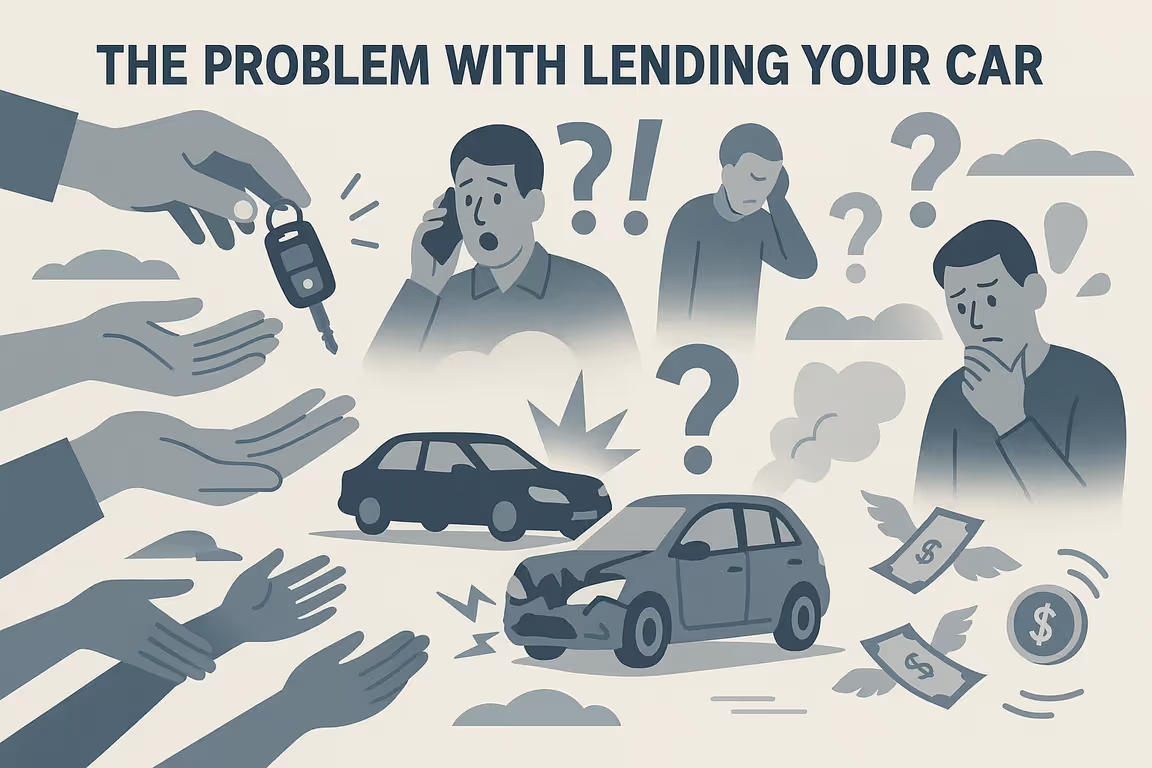
- Florida's dangerous instrumentality doctrine holds car owners liable for accidents caused by permitted drivers, even without fault.
- Your auto insurance typically provides primary coverage when someone else drives your car with permission.
- Carrying adequate liability limits and umbrella coverage protects against personal asset exposure from serious accidents.
Worried About Your Injury Case? We'll Review It - Free!


Understanding the Problem: When Someone Else Crashes Your Car
The phone call comes at the worst possible time. You're at work, focused on an important meeting, when your phone buzzes with a number you don't recognize. On the other end, a shaky voice explains that they've just been in an accident—while driving your car. Your mind races with questions: Is everyone okay? How bad is the damage? And perhaps most urgently: Who's going to pay for all this?
If you've ever lent your car to someone, you're not alone in wondering what happens when someone who isn't on your insurance crashes your vehicle. This scenario plays out across Melbourne and Brevard County every day. Maybe it's your college-age child home for the holidays, a friend whose car is in the shop, or a coworker who needs transportation for a quick errand. In our close-knit Central Florida communities, helping each other out is second nature—but it can also create unexpected legal and financial complications.
The truth is, most Florida drivers don't fully understand how their auto insurance coverage works when someone else is behind the wheel. The rules governing liability, coverage, and financial responsibility are complex and often counterintuitive. What seems like a simple act of kindness—tossing your keys to someone in need—can potentially expose you to significant legal and financial risks that many people never consider.
In Melbourne and the surrounding Brevard County area, we see these situations arise frequently. Whether it's tourists visiting our beautiful beaches who need temporary transportation, seasonal residents sharing vehicles, or locals helping neighbors in emergency situations, the question of what happens when someone not on your insurance crashes your car affects thousands of families each year.
This comprehensive guide will walk you through everything you need to know about lending your vehicle to others in Florida. We'll explore how our state's unique insurance laws work, when you might be legally liable for damage caused by someone else driving your car, and most importantly, how to protect yourself and your family from unexpected financial exposure. Whether you're the generous car owner or someone who has been injured in an accident involving a borrowed vehicle, understanding these rules can save you from costly mistakes and help ensure you get the protection you deserve.
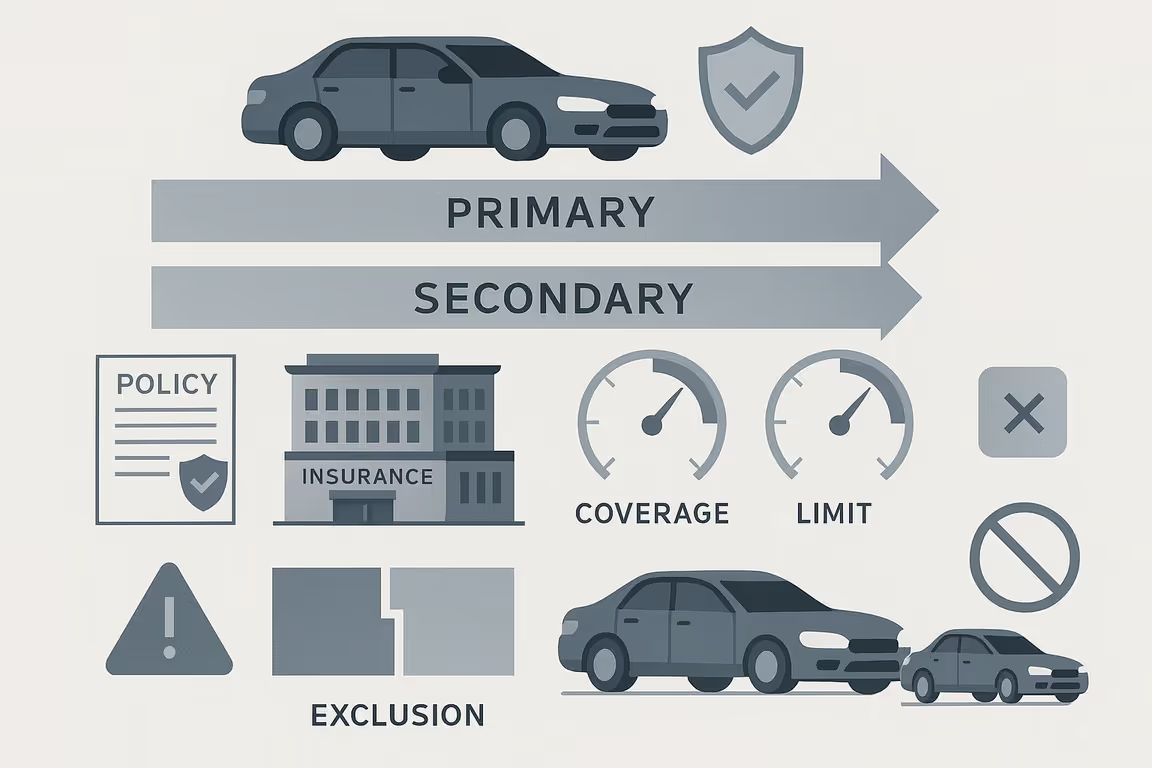
How Florida's Dangerous Instrumentality Doctrine Works
Florida operates under a unique set of laws that determine financial responsibility when accidents happen. Understanding these rules is crucial for every car owner in the state, as they can significantly impact your liability when someone else drives your vehicle.
Florida's No-Fault System Basics
Florida is one of only a few states that operates under a "no-fault" insurance system. This means that after most car accidents, each person's own insurance company pays for their medical expenses and lost wages, regardless of who caused the crash. Every Florida driver must carry Personal Injury Protection (PIP) insurance that covers at least 80 percent of necessary and reasonable medical expenses up to $10,000, along with 60 percent of lost wages and essential services.
However, the no-fault system only applies to certain types of damages. While PIP covers medical bills and lost wages up to policy limits, property damage claims—like repairs to the vehicles involved—still follow traditional liability rules. This distinction becomes especially important when someone else is driving your car, as your vehicle's damage will typically be handled differently than medical expenses.
The "Dangerous Instrumentality Doctrine" Explained Simply
Under Florida law, motor vehicles are considered "dangerous instruments" due to their potential to cause significant harm. This legal principle, known as the dangerous instrumentality doctrine, holds vehicle owners strictly liable for damages caused by anyone driving their car with permission, even if the owner wasn't present or involved in the accident.
Here's what this means in practical terms: If you lend your car to a friend and they cause an accident that results in $50,000 in property damage plus serious injuries to another driver, you as the car owner can be held legally responsible for those damages, even though you were nowhere near the scene. This liability exists regardless of whether you were negligent or did anything wrong—it's what lawyers call "strict liability."
For Melbourne and Brevard County residents, this doctrine has real implications. Our experienced car accident lawyers have handled numerous cases where well-meaning car owners found themselves facing significant financial exposure because they weren't aware of this legal principle.
Permission vs. No Permission: The Critical Distinction
The dangerous instrumentality doctrine only applies when the driver had permission to use your vehicle. Florida law recognizes two types of permission:
Express permission occurs when you verbally or in writing give someone permission to drive your car. This might be as simple as saying "Sure, you can borrow my car to run to the store."
Implied permission can exist based on the circumstances and your relationship with the driver. For example, if your teenage child regularly drives your car to school with your knowledge, this creates implied permission for those trips, even if you don't specifically authorize each individual use.
When someone drives your car without permission—such as in cases of theft or when they exceed the clear boundaries of your authorization—the dangerous instrumentality doctrine typically doesn't apply, and you won't be held liable for damages they cause.
Recent Legal Changes: The Emerson v. Lambert Decision
In November 2023, the Florida Supreme Court issued an important decision in Emerson v. Lambert that narrowed the scope of the dangerous instrumentality doctrine in certain family situations. The court ruled that when one family member has possession of a vehicle but is not the owner (such as a child using a parent's car), that family member generally cannot be held vicariously liable when another family member drives the vehicle and causes an accident.
While this decision provides some protection for family members in specific situations, it doesn't eliminate the dangerous instrumentality doctrine. Vehicle owners can still be held liable when others drive their cars with permission, and the doctrine remains a powerful legal tool that affects thousands of Florida families each year.
When You're NOT Liable as a Car Owner
Understanding when you won't be liable is just as important as knowing when you will be. Generally, you won't face liability under the dangerous instrumentality doctrine when:
- Your car was truly stolen or taken without any form of permission
- The driver clearly exceeded the scope of permission you granted (for example, you said they could drive to the grocery store, but they took your car on a week-long road trip)
- Your insurance policy contains specific exclusions that apply to the situation
- The driver was using your vehicle for business purposes not covered under your personal auto policy
The key in many of these situations is documentation and clear communication about the boundaries of permission when you lend your vehicle to others.

Insurance Coverage Rules for Borrowed Vehicles
The relationship between auto insurance coverage and vehicle lending involves multiple layers of complexity that can catch even experienced drivers off guard. Understanding how coverage works in these situations is essential for protecting yourself financially.
The Basic Rule: Insurance Follows the Car
In Florida, auto insurance generally "follows the car" rather than the driver. This means that when you give someone permission to drive your vehicle, your insurance policy typically provides the primary coverage for any accidents they cause. The driver's personal auto insurance, if they have it, usually serves as secondary coverage that might apply after your limits are exhausted.
Consider this example: Your friend has minimum Florida coverage of $10,000 for property damage, but your policy includes $100,000 in property damage liability. If your friend crashes your car and causes $75,000 in damage to another vehicle, your insurance would be primarily responsible for the claim, potentially saving your friend from significant personal liability.
This "insurance follows the car" rule generally works in your favor when you're driving someone else's vehicle with permission, as you'll have the benefit of their coverage. However, it also means that when you lend your car to others, you're potentially exposing your insurance policy and coverage limits to claims.
Coverage Types and Scenarios
Liability Coverage is the foundation of auto insurance in Florida and covers bodily injury and property damage that you (or permitted drivers) cause to others. This coverage typically extends to anyone driving your car with permission, subject to policy terms and exclusions.
Collision Coverage pays for damage to your own vehicle regardless of who was at fault. If your friend crashes your car into a tree, your collision coverage would typically cover the repairs to your vehicle, minus your deductible. However, some insurance companies may raise your deductible or apply other penalties when a non-household member drivers your car.
Comprehensive Coverage protects against non-collision damage like theft, vandalism, or weather damage. This coverage usually protects you whether you're driving or someone else is using your car with permission.
When Insurance Companies Say "No"
Insurance companies regularly deny claims related to borrowed vehicles, often citing policy exclusions or arguing that the use wasn't covered under the policy terms. Common denial reasons include:
Business use exclusions: If someone borrows your car to make deliveries, drive for a rideshare company, or conduct other business activities, your personal auto policy may exclude coverage entirely.
Excluded drivers: Some policies specifically exclude certain individuals from coverage. If you've excluded a particular person from your policy due to their poor driving record, your insurance won't cover accidents they cause while driving your car.
Criminal activity: Insurance policies typically exclude coverage when your vehicle is used in the commission of a crime or when the driver is under the influence of drugs or alcohol.
Geographic limitations: Some policies may limit coverage when vehicles are used outside certain geographic areas or for extended periods.
When insurance companies wrongfully deny legitimate claims, policyholders may need legal assistance to ensure they receive the coverage they paid for. Our personal injury lawyers work with accident victims whose claims have been improperly denied or undervalued by insurance companies.
Coverage Limits Reality Check
Florida's minimum insurance requirements are among the lowest in the nation, requiring only $10,000 in PIP coverage and $10,000 in property damage liability. Many drivers carry only these minimum limits, which creates significant gaps in protection.
Consider a real-world scenario: If someone borrows your car and causes an accident that results in $75,000 in medical bills and $25,000 in property damage, but your policy only provides $10,000 in liability coverage, you could be personally responsible for the remaining $90,000. This exposure is particularly concerning given that medical costs for serious injuries routinely exceed $100,000.
In Melbourne and Brevard County, where we have significant tourist traffic and higher-than-average accident rates on major corridors like I-95 and US-1, carrying adequate insurance coverage becomes even more critical. The difference between minimum coverage and comprehensive protection can mean the difference between minor financial inconvenience and life-altering debt.
Uninsured and Underinsured Driver Complications
Approximately 20 percent of Florida drivers operate vehicles without any insurance coverage, despite state requirements. When an uninsured person borrows your car and causes an accident, your insurance typically becomes the only source of immediate recovery for injured parties. This scenario can quickly exhaust your policy limits and expose you to personal liability for amounts exceeding your coverage.
Similarly, many Florida drivers carry only minimum insurance limits that may be inadequate for serious accidents. When an underinsured driver borrows your car, your policy must bridge the gap between the damages they cause and their ability to pay, potentially exposing you to significant financial risk.
The interaction between various coverage types, policy limits, and multiple insurance companies can create complex situations that require careful analysis and often professional legal guidance to resolve properly.

Personal Liability and Asset Protection for Car Owners
Beyond insurance coverage, car owners in Florida face potential personal liability that can have lasting financial consequences. Understanding these risks and how to minimize them is crucial for protecting your assets and financial future.
When Personal Lawsuits Happen
Even with insurance coverage, car owners can face personal lawsuits in several circumstances. When someone borrows your car and causes serious injuries, the damages often exceed available insurance coverage. Medical bills for traumatic brain injuries, spinal cord damage, or multiple surgeries can easily reach hundreds of thousands or even millions of dollars. When insurance coverage is insufficient, injured parties may pursue personal injury lawsuits against the car owner under the dangerous instrumentality doctrine.
Our firm has recovered over $1 billion for accident victims throughout Florida, including a landmark $28.5 million brain injury verdict right here in Melbourne. These cases demonstrate the significant financial exposure that car owners can face when serious accidents occur involving their vehicles.
Insurance companies sometimes refuse to defend their policyholders or may deny coverage entirely, leaving car owners to face lawsuits without the protection they thought they had purchased. In these situations, car owners need experienced legal representation to protect their interests and challenge wrongful insurance denials.
Understanding Your Personal Asset Exposure
When you face liability beyond your insurance coverage, your personal assets may be at risk. In Florida, creditors can potentially pursue bank accounts, investment accounts, and certain types of personal property to satisfy court judgments. While Florida law provides some protection for primary residences through homestead exemptions, this protection has limits and may not apply in all circumstances.
For families with significant assets—whether real estate, retirement accounts, or business interests—the potential exposure from car lending can be substantial. A single serious accident involving your borrowed vehicle could potentially affect your family's financial security for years to come.
Young professionals in Melbourne and Brevard County often underestimate this risk. A recent college graduate with a good job and growing savings might think they have little to lose, but a large judgment could garnish future wages and severely impact their ability to build wealth throughout their career.
Criminal vs. Civil Liability: Understanding the Distinction
It's important to understand that car owners typically don't face criminal charges when someone else crashes their vehicle. Criminal liability generally requires some form of intentional wrongdoing or reckless behavior. However, there are exceptions—if you knowingly lend your car to someone you know is intoxicated or has a suspended license, you could potentially face criminal charges.
Civil liability, on the other hand, doesn't require any wrongdoing on your part. Under the dangerous instrumentality doctrine, your status as the car owner is sufficient to create liability, regardless of whether you acted responsibly. This distinction is crucial because it means that even careful, responsible car owners can face significant financial exposure through no fault of their own.
Protecting Yourself Before Problems Arise
Insurance Strategy: The most effective protection involves carrying adequate insurance coverage. Consider increasing your liability limits to $250,000 per person and $500,000 per accident, or even higher if you have significant assets. Umbrella insurance policies can provide an additional million dollars or more in liability protection for a relatively modest annual premium.
Lending Decisions: Be selective about who you allow to drive your car. Know the person's driving record, and verify that they have a valid driver's license. Set clear boundaries about how and when your vehicle can be used, and document these limitations in writing when appropriate.
Family Considerations: If you have teenage drivers or young adults in your household, ensure they're properly listed on your insurance policy. Trying to save money by not listing young drivers can backfire catastrophically if they're involved in a serious accident.
When Legal Help Is Essential
For car owners facing lawsuits, experienced legal representation is crucial when insurance companies deny coverage, when claims exceed policy limits, or when complex liability questions arise. An experienced attorney can review insurance policies, challenge wrongful denials, and develop strategies to protect personal assets.
For injured parties in these types of accidents, the situation is equally complex. Insurance companies often offer quick, low settlements that don't adequately compensate for serious injuries, particularly those with long-term effects. When multiple insurance policies and complex coverage issues are involved, professional legal guidance becomes essential to ensure fair compensation.
As trial attorneys with nearly four decades of experience in Florida, our Melbourne personal injury attorneys focus exclusively on protecting injured accident victims. We understand the complexities of Florida's insurance laws and have the trial experience necessary to hold insurance companies accountable when they fail to honor their obligations to accident victims.
The key to protecting yourself, whether as a car owner or an accident victim, is understanding your rights and taking action quickly when serious accidents occur. The decisions made in the immediate aftermath of an accident can have lasting consequences for everyone involved.

Essential Steps Before and After Accidents
Taking proactive steps to protect yourself and understanding what to do when accidents happen can make the difference between a minor inconvenience and a major financial crisis.
Before an Accident: Prevention and Preparation
Review Your Insurance Coverage Regularly: Contact your insurance agent annually to review your coverage limits and ensure they're adequate for your current situation. As your income and assets grow, your insurance coverage should grow accordingly. Consider whether your current limits would be sufficient if someone borrowed your car and caused a serious accident.
Understand Your Policy Terms: Read your actual insurance policy, paying particular attention to exclusions and limitations on covered drivers. Some policies automatically cover any licensed driver with your permission, while others have more restrictive terms. Understanding these details before you need to rely on your coverage is essential.
Document Vehicle Use Agreements: When lending your car for extended periods or specific purposes, consider documenting the terms in writing. Specify who can drive the vehicle, for what purposes, and any restrictions on use. While not always necessary, clear documentation can prevent disputes later about the scope of permission.
Consider Technology Solutions: Dash cameras, GPS tracking, and smartphone apps can provide valuable evidence if accidents occur. Some insurance companies even offer discounts for vehicles equipped with safety monitoring technology.
Immediately After an Accident: Critical Steps
For Car Owners: When you learn that someone has crashed your borrowed vehicle, your immediate priorities should be ensuring everyone's safety and protecting your legal and financial interests. Contact law enforcement if required—Florida law mandates police reports for accidents involving injuries, fatalities, or property damage exceeding $500.
Notify your insurance company immediately, even if you weren't present at the accident. Provide factual information about who had permission to drive your vehicle and the circumstances of that permission. Avoid speculating about fault or making statements that could be misinterpreted later.
Document everything you can: take photos of the accident scene and vehicle damage if possible, obtain witness contact information, and get the police report number. Insurance companies and attorneys will need this information to properly handle your claim.
For Accident Victims: If you're injured in an accident involving a borrowed vehicle, seek medical attention immediately, even if your injuries seem minor. Some serious injuries, particularly concussions and soft tissue damage, may not manifest symptoms immediately but can have lasting effects.
Don't accept quick settlement offers from insurance companies without understanding the full extent of your injuries and the complex coverage issues that may be involved. When multiple vehicles and insurance policies are involved, the situation becomes significantly more complex, and insurance companies may try to minimize their exposure by offering inadequate settlements.
Based on our experience with thousands of accident cases since 1985, we strongly recommend that anyone seriously injured in an accident involving a borrowed vehicle consult with experienced legal counsel before accepting any settlement offers or signing any documents.
Dealing with Insurance Companies
Insurance companies are businesses focused on minimizing their financial exposure. While they have an obligation to handle claims fairly, they also have a financial incentive to resolve claims for as little as possible. Understanding this dynamic is crucial when dealing with claims involving borrowed vehicles, where coverage issues can be particularly complex.
Cooperate fully with your insurance company's investigation, but be careful about providing recorded statements or signing documents without understanding their implications. Insurance adjusters are trained professionals who know how to ask questions that may limit your coverage or compensation.
If your insurance company denies coverage or offers a settlement that seems inadequate given the circumstances, don't assume they're right. Insurance companies make mistakes, and they sometimes deny legitimate claims hoping that policyholders won't challenge their decisions.
Brevard County Specific Procedures
In Brevard County, traffic violations related to accidents can be handled through the clerk of court system. Citations that don't involve serious bodily injury or fatalities typically don't require court appearances, but it's important to respond appropriately to any tickets issued in connection with an accident.
If criminal charges are filed or if the accident involves serious injuries, you may need to appear in court. Having experienced legal representation becomes crucial in these situations, as the outcome of criminal proceedings can affect civil liability and insurance coverage.
Our Commitment to Accident Victims: Since founding our firm in 1988, Doug Beam has dedicated his career to fighting for injured accident victims throughout Central Florida. Our team has recovered over $1 billion in verdicts and settlements, including our recent $28.5 million brain injury verdict that shocked the Melbourne legal community.
We work exclusively on a contingency fee basis, meaning you don't pay attorney fees unless we recover compensation for your injuries. This arrangement allows us to take on all the risk while ensuring our clients get the best possible representation, regardless of their financial situation.
As trial-ready attorneys, we're prepared to take insurance companies to court when they fail to offer fair compensation for serious injuries. Insurance companies know our reputation and our track record, which often leads to better settlement offers for our clients without the need for lengthy court battles.
Frequently Asked Questions
What if my friend crashes my car and someone gets hurt?
Under Florida's dangerous instrumentality doctrine, you as the car owner can be held liable for injuries and damages caused by someone driving your car with permission. Your insurance would typically provide primary coverage, but if damages exceed your policy limits, you could face personal liability for the difference.
Will my insurance rates go up if someone else crashes my car?
Unfortunately, yes. Most insurance companies will increase your premiums after any claim involving your vehicle, regardless of who was driving. The increase depends on the severity of the accident, your previous claims history, and your specific insurance company's policies.
Can I sue my friend if they crash my car?
While technically possible, such lawsuits are rare and often complicated by insurance coverage and personal relationships. In most cases, your collision coverage would repair your vehicle, minus your deductible. You might consider pursuing your friend for the deductible amount, but weigh the potential damage to your relationship against the financial recovery.
What if the person who borrowed my car was drunk?
Drunk driving significantly complicates the situation. While your insurance may still provide coverage, many policies contain exclusions for criminal activity. You could also potentially face liability for negligent entrustment if you knew or should have known the person was intoxicated when you lent them your car.
Is there a difference between family members and friends borrowing my car?
Generally, the dangerous instrumentality doctrine applies equally to family members and friends, though recent court decisions have created some limitations in specific family situations. The more important distinction is whether the person had permission to use your vehicle and whether they're covered under your insurance policy.
What if my car was stolen and the thief caused an accident?
True theft situations typically don't create liability for car owners under the dangerous instrumentality doctrine. However, insurance companies and courts will carefully examine whether the use was actually theft or whether there was some form of permission. Clear documentation of the theft, including a police report, is essential.
How long do I have to file a lawsuit in Florida?
Florida's statute of limitations for personal injury cases is generally two years from the date of the accident. However, this deadline can vary based on the specific circumstances of your case, and there are important exceptions that could shorten or extend this timeframe. If you're considering legal action, consult with an attorney as soon as possible to protect your rights.
When should I contact a personal injury attorney?
Contact an experienced attorney if you've been seriously injured in an accident involving a borrowed vehicle, if insurance companies are offering settlements that seem inadequate, or if there are disputes about coverage or liability. The complex coverage issues involved in these cases often require professional legal analysis to ensure your rights are protected.
If you're facing potential liability as a car owner, consider consulting with an attorney if your insurance company denies coverage, if damages exceed your policy limits, or if you're being sued personally.
Get the Help You Deserve: If you've been injured in an accident involving someone else's vehicle, don't face the insurance companies alone. Contact our experienced legal team for a free consultation to discuss your case and learn about your options. Call us at (321) 723-6591 to speak with our Melbourne personal injury lawyers who have been fighting for accident victims since 1988.
This article provides general information and is not a substitute for legal advice. Laws can change, and the details of your situation matter. For personalized guidance, please contact a qualified Florida personal injury attorney.
Sources and Further Reading
- Florida Motor Vehicle Insurance Information – Florida Highway Safety and Motor Vehicles
- Involved in a Crash – FLHSMV Requirements and Procedures
- Florida Motor Vehicle No-Fault Law – Florida Senate Statutes
- Florida Financial Responsibility Law – State Legislature
- Florida's Dangerous Instrumentality Doctrine – Legal Analysis
- Permissive Use Doctrine in Florida – Insurance Law Analysis
- Recent Florida Supreme Court Dangerous Instrumentality Decision
- Brevard County Traffic Court Procedures
Please remember, this article provides general information based on Florida law and is intended for educational purposes only. It does not constitute legal advice and should not be relied upon as such. Every case is unique, and the information here may not apply to your specific circumstances. Reading this article does not create an attorney-client relationship. For advice tailored to your situation, please consult with a qualified attorney.
Not Sure What To Do Next? We Can Help – Fast & Free.
Worried About Your Injury Case?
We'll Review It - Free
Don’t miss an article
Florida law, local insights, and the occasional dog pic.
Delivered straight to your inbox.
More articles
Browse all articlesFree Case Review
Get a complimentary review of your case

.webp)
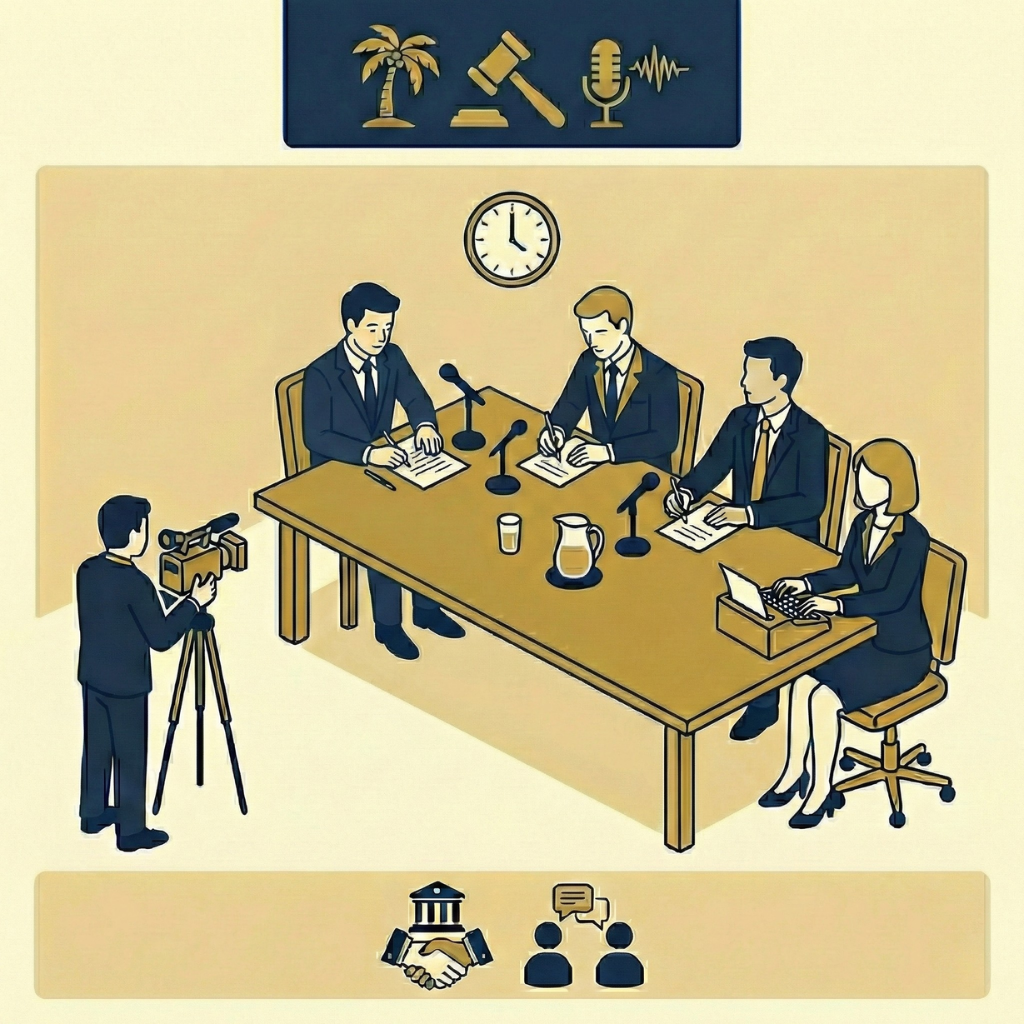
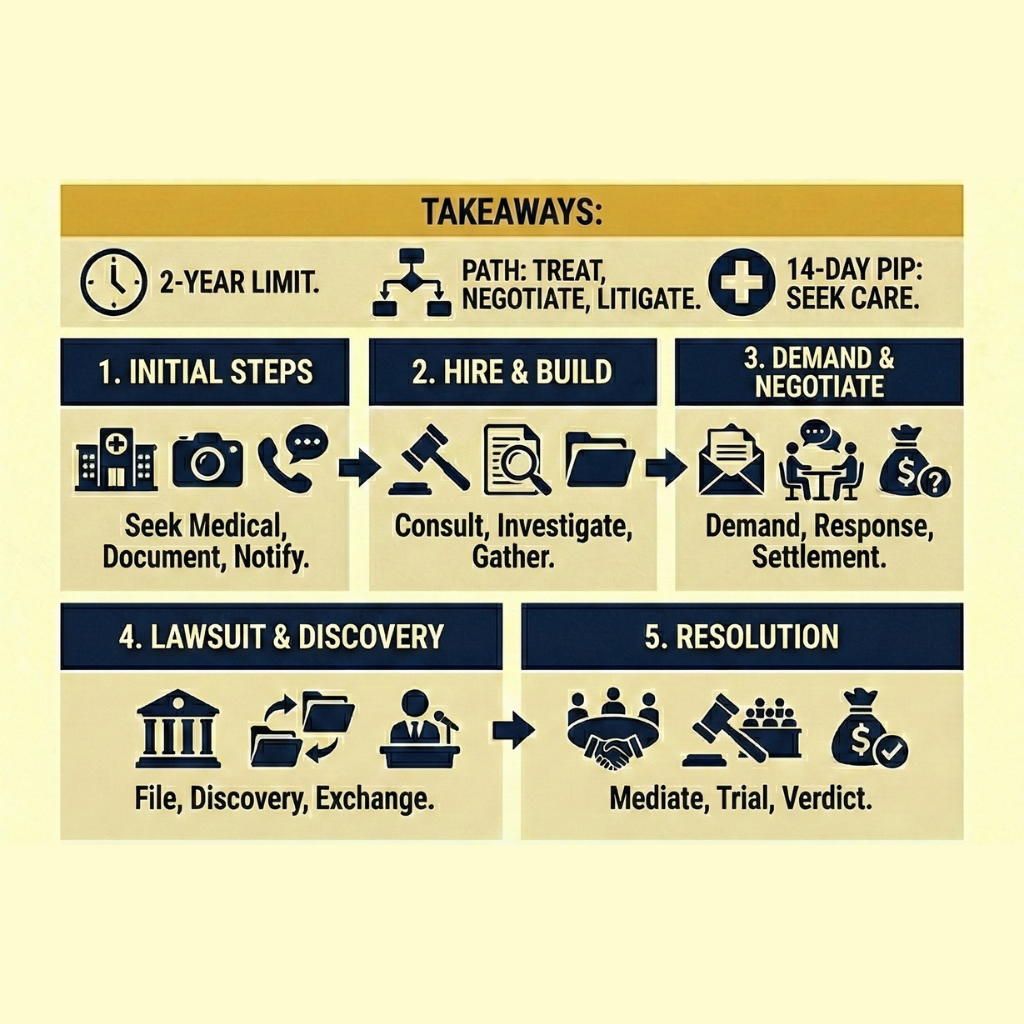


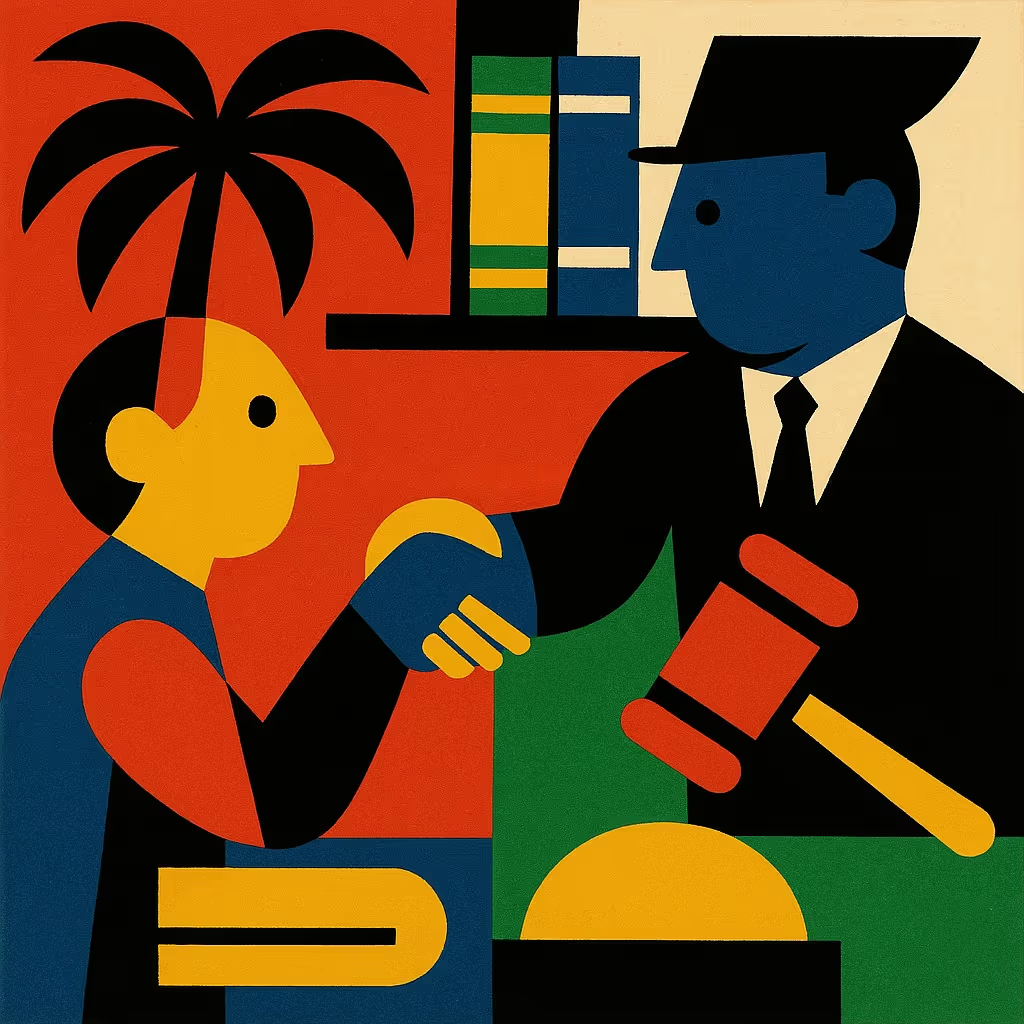
.png)
